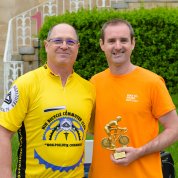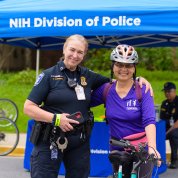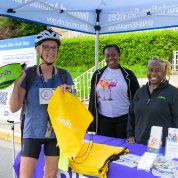Bike to Work Day Brings NIH Cyclists Together
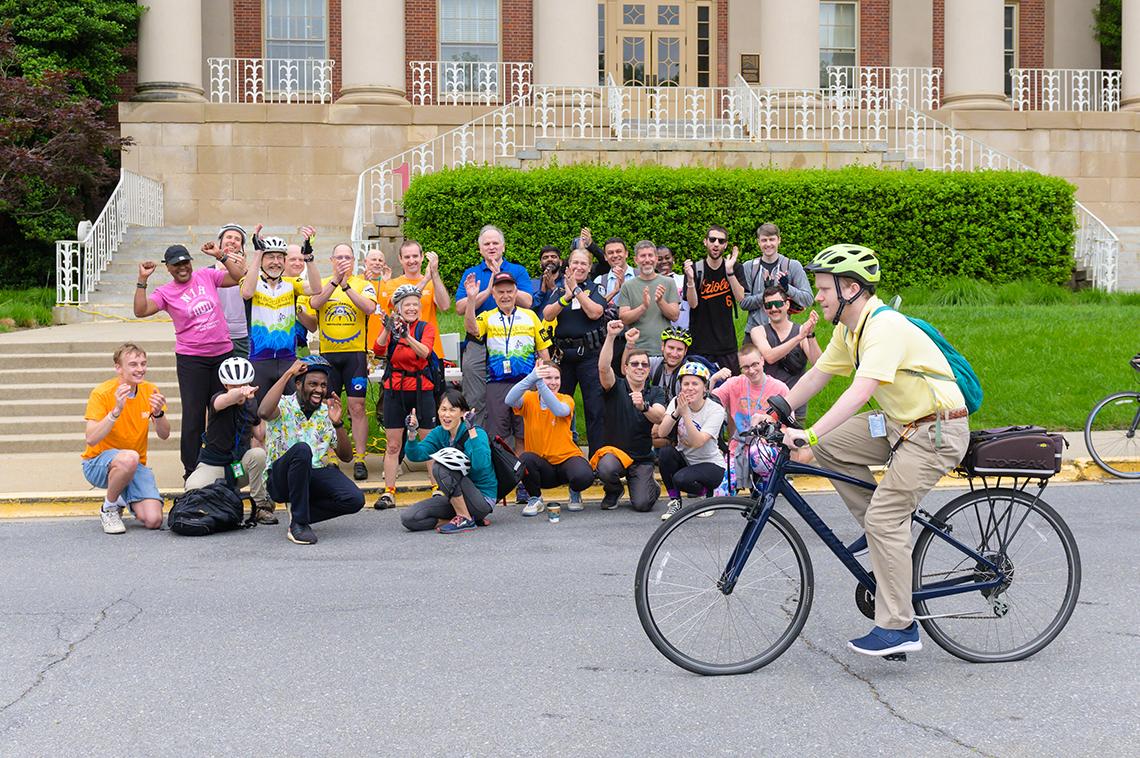
Photo: Marleen Van Den Neste
A few hundred NIH’ers stopped by the “pit stop” in front of Bldg. 1 to celebrate Bike to Work Day (BTWD) on May 17. More than 265 registered cyclists dropped by NIH’s station.
According to the Metropolitan Washington Council of Governments, which sponsors BTWD in the national capital region, the event encourages commuters to choose a healthier lifestyle while also helping to reduce traffic congestion and improve air quality.
At the station in front of Bldg. 1, riders could grab a cup of coffee and a free T-shirt, have a mechanic do a bike check, register their bikes with the NIH Police Department and mingle with their fellow riders.

Photo: Marleen Van Den Neste
This year, NIH’ers biked 903 miles total. They saved 798 lbs. of CO2-eq emissions. The National Cancer Institute (NCI) had the most cyclists. The longest ride was 25 miles and the average commute was almost 6 miles.
“BTWD is a great time,” said Joe Cox, chief of the Transportation Services Branch, Division of Amenities and Transportation Services (DATS), Office of Research Services. “Everyone always enjoys coming out. I see the same faces every year. Even some of the retirees come back.”
Encouraging employees to cycle to work is a “no-brainer,” he added. Biking to work also has environmental and health benefits. Additionally, bike commuters use less parking.
NCI’s Steve Friedman has been biking to work for more than 18 years. He rides 13 miles each way.
“I don’t drink coffee, so biking is a great way to wake up in the morning and get energized,” he said.

Photo: Marleen Van Den Neste
For those interested in biking to work, spring is a great time to try. Friedman suggested pedaling with a friend who cycles more often to pick up hints and tips. “Soon enough, you’ll be riding on your own and looking forward to riding to work.”
Friedman presented the annual Carl Henn Award to Sean Cullinane, DATS quality assurance specialist. Henn, who passed away in 2010, was a co-founder and president of the NIH Bicycle Commuter Club (NIHBCC) and a dedicated environmentalist. The award is given to someone who exemplifies his values.
Cullinane has been a great supporter of the NIHBCC over the years, said Friedman. He’s been a tremendous resource at events like BTWD. For the past seven years, he’s also worked with the club to craft cyclist-friendly policies and keep lines of communication open between DATS and NIHBCC. He also works with the Department of Environmental Services to track emissions saved as a result of bike commuters.
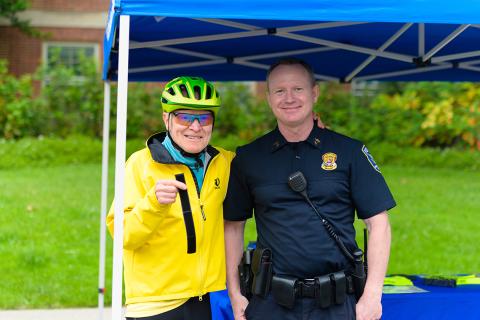
Photo: Marleen Van Den Neste
“Getting an award for bicycle advocacy means quite a bit to me,” said Cullinane. “I grew up in the D.C. area and have been biking around since I was eight years old. I bought my first car when I was 35, so I’ve spent my life biking everywhere and as much as I can.”
Dr. Franziska B. Grieder of the Office of the Director wore her 2005 BTWD t-shirt. She hopes to see the return of the bicycle commuter subsidy, a $20-per-month stipend for bikers who forgo a parking pass or transit subsidy. The allowance for cyclists ended Jan. 1, 2018 as a result of the tax reform package referred to as the “Tax Cuts and Jobs Act.”
Members of the NIH Police were on hand to help employees register their bikes with local law enforcement and Montgomery County. Registering a bike makes it easier to identify and recover a bike if it is lost or stolen.
Interested in commuting to NIH by bike? Visit https://www.nihbike.com/.




